Key takeaways:
- Networking is about building meaningful relationships, which can lead to personal and professional growth through genuine interactions.
- Local business networking fosters community support, trust, and referral opportunities, showcasing the interconnectedness of business success.
- Common fears of networking include rejection, feelings of inadequacy, and anxiety about initiating conversations, but techniques like preparation and mindfulness can help overcome these challenges.
- Effective follow-up after networking events can strengthen connections; personalizing messages and being patient in awaiting responses is crucial for building lasting relationships.
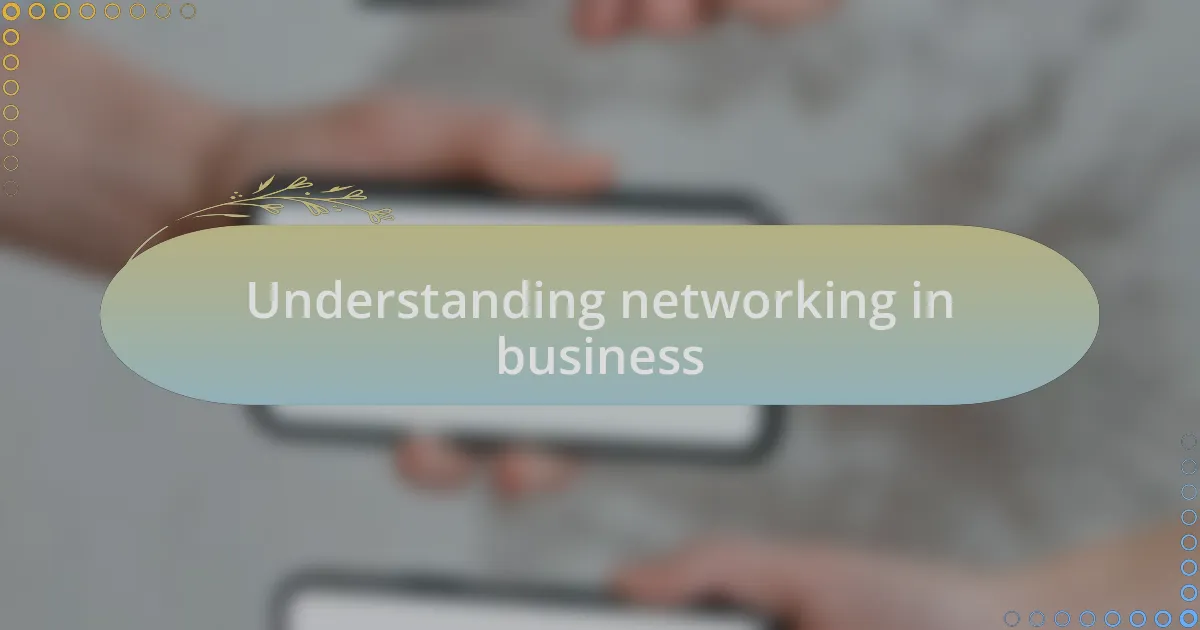
Understanding networking in business
Networking in business is more than just exchanging business cards; it’s about building meaningful relationships. I remember when I first attended a local networking event and felt completely out of my element. It was intimidating, standing in a room filled with confident professionals, but I soon realized that everyone was there for the same reason: to connect and support one another.
Engaging with others in the business world can often feel daunting, yet I believe it’s essential for growth. I had a moment where I pushed myself to approach someone I admired. Not only did that conversation open doors to new opportunities, but it also reminded me that vulnerability can lead to genuine connections. Have you ever wondered how many potential partnerships you might be missing out on simply because you hesitated to reach out?
Understanding networking means recognizing the value of every interaction. Each conversation is a chance to share insights, learn, and build trust. For instance, I once struck up a discussion with someone over coffee, and we ended up collaborating on a project that aligned with both our interests. That experience taught me that the simplest conversations can lead to impactful results, proving that networking truly can foster growth both personally and professionally.
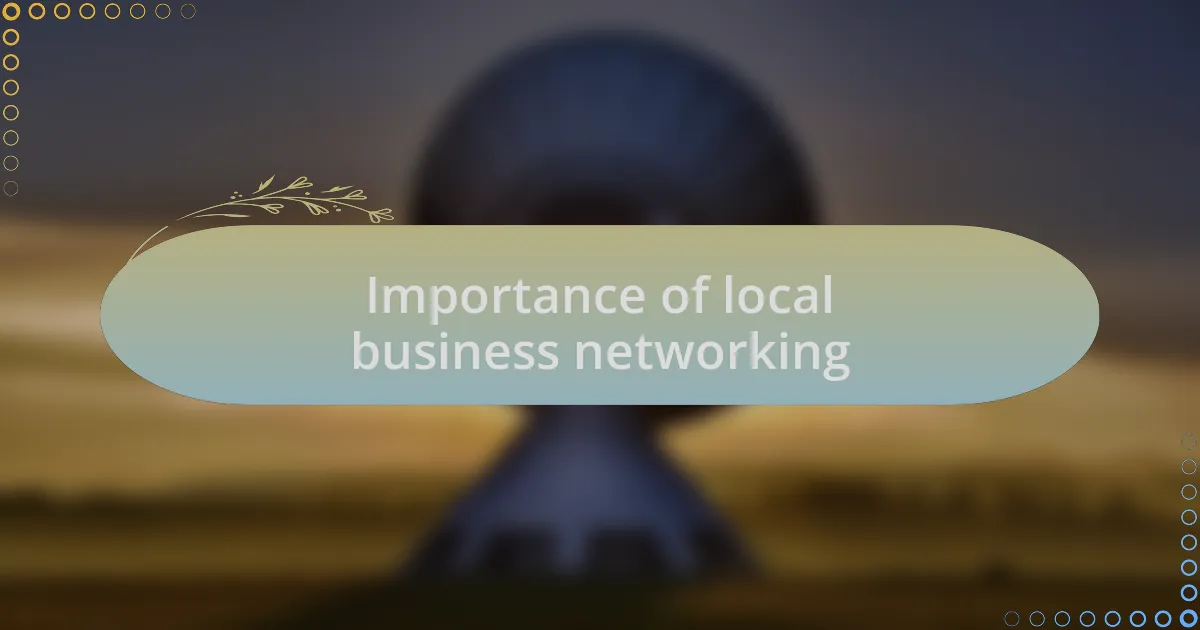
Importance of local business networking
Local business networking is vital because it fosters community support and collaboration. I still recall the first time I walked into my local chamber of commerce event. I noticed how everyone seemed eager to share their experiences and insights. It struck me just how powerful collective knowledge can be when we come together as a community.
Beyond just pooling resources, networking helps build trust among local businesses. There was a time when I faced a significant challenge with one of my projects. By reaching out to a fellow business owner in my network, I not only found a solution but also forged a lasting friendship. It’s amazing how a simple conversation can transform obstacles into opportunities, don’t you think?
Another key aspect of local networking is the potential for referrals. A connection I made at a casual meet-up referred me to a client who became one of my best partners. This experience underscored how our successes are often intertwined, and I believe that nurturing these relationships can lead to exponential growth for everyone involved. What if every acquaintance you made could open new doors you hadn’t even considered?
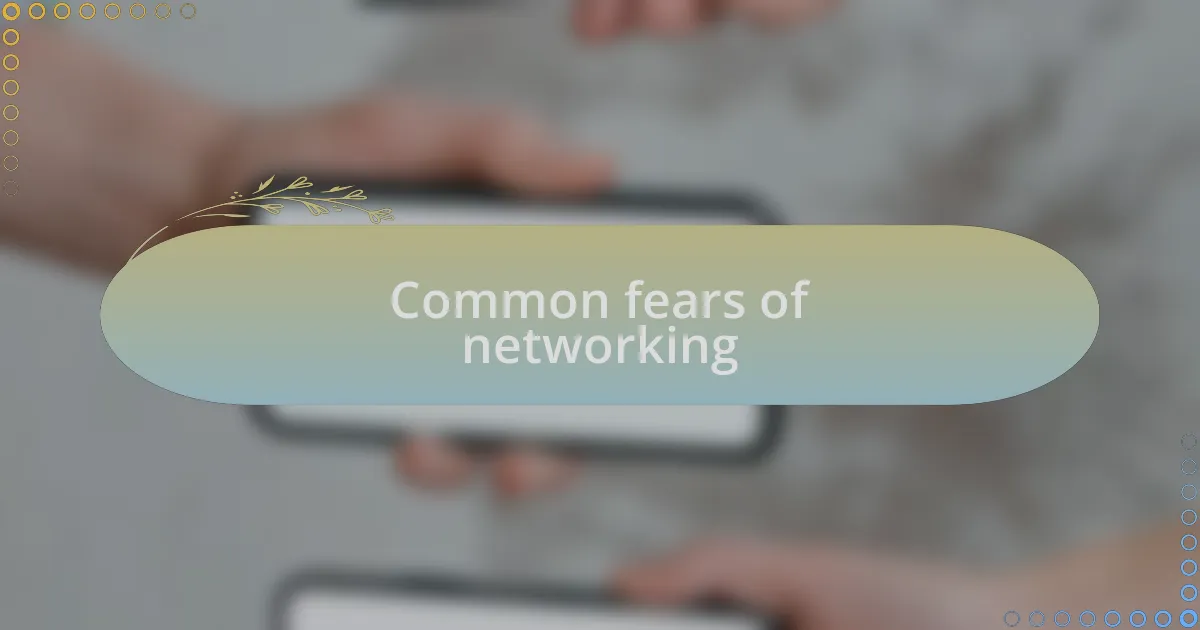
Common fears of networking
Networking often triggers common fears that can hold individuals back. One of my biggest fears was the fear of rejection. I can vividly remember standing at the entrance of a networking event, my heart racing, wondering if anyone would even want to talk to me. It felt as though everyone else had their established circles, leaving me on the outside looking in. I still question, what if they don’t see value in me?
Another prevalent fear is feeling out of place or lacking knowledge compared to others. I recall attending a seminar where the conversations seemed filled with jargon and industry trends I wasn’t familiar with. I felt like an imposter, fearing that my contributions wouldn’t measure up. Have you ever felt that pressure to know everything when, in reality, it’s the connection and conversation that matter most?
Lastly, there’s the overwhelming anxiety of initiating conversations. I often struggled to approach someone new, worrying about the potential awkwardness that might arise. I remember one event where I spent the first hour just sitting, convinced I wouldn’t know what to say. But in hindsight, starting with simple questions and genuine curiosity helped ease that tension, transforming those moments from daunting to fulfilling. What if the person next to you is just as nervous?
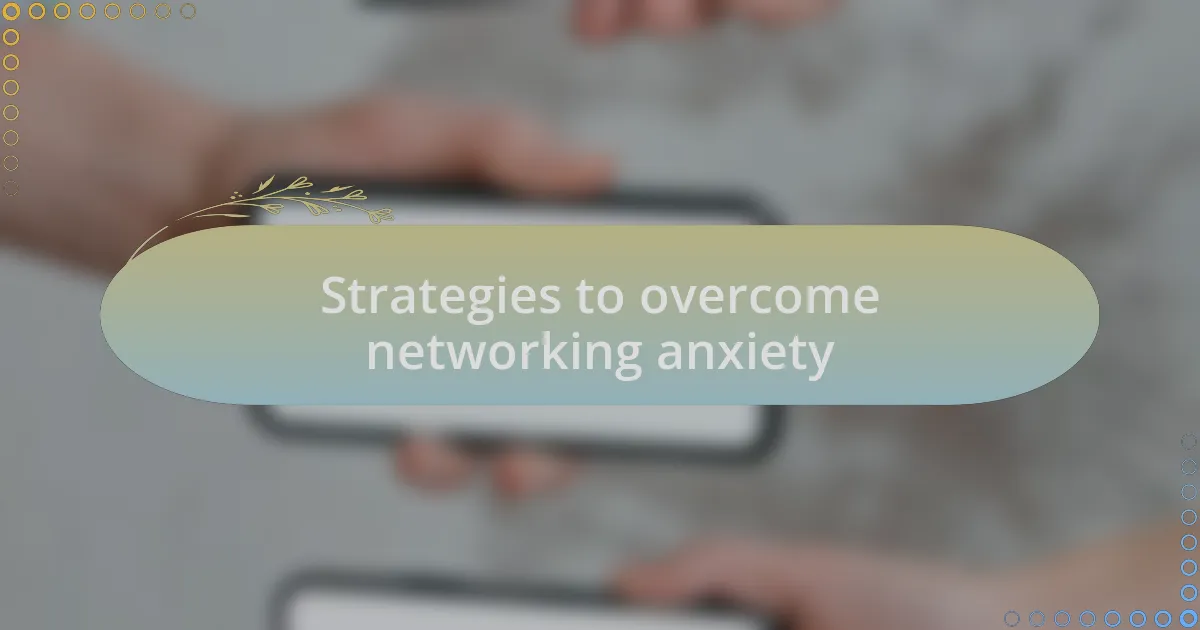
Strategies to overcome networking anxiety
When I faced networking anxiety, one effective strategy was to prepare a few conversation starters ahead of time. I remember jotting down a couple of intriguing questions or topics that I could comfortably discuss. Having those in my back pocket made it easier to approach people. Why does this work? It reduces the pressure of spontaneity and gives you a clear path to engage without feeling overwhelmed.
Another helpful strategy was practicing mindfulness before attending an event. I found that taking a few deep breaths and focusing on being present allowed my mind to settle. In those moments by myself, I reminded myself that everyone else was likely just as eager to connect. Isn’t it reassuring to think that we’re all navigating the same uncertainties?
I also discovered the power of setting small, achievable goals during networking opportunities. Rather than trying to network with everyone in the room, I aimed to have meaningful conversations with just two or three individuals. This approach transformed my experience from daunting to manageable. Have you ever tried focusing on quality over quantity? It not only built my confidence but also led to deeper connections that benefitted my local business endeavors.
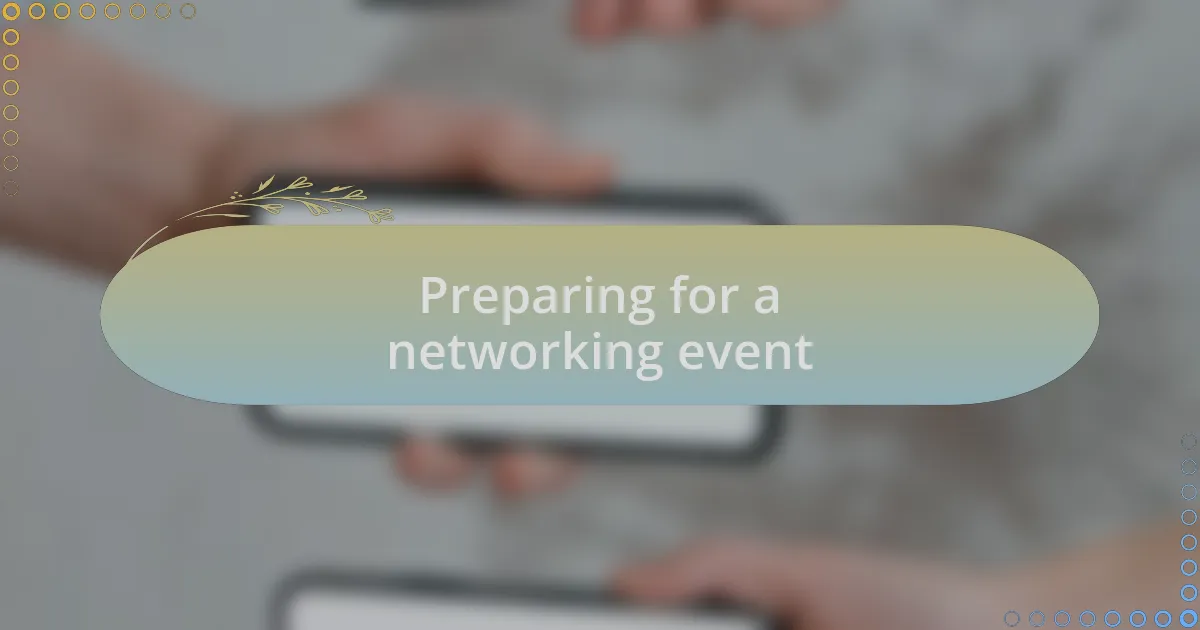
Preparing for a networking event
Preparing for a networking event can be a game changer for managing anxiety. I often find that creating a detailed plan helps me feel more in control. For instance, I sketch out the event layout in my mind, note potential contacts I want to approach, and even practice my own introduction. This preparation reduces uncertainty and gives me a sense of purpose—doesn’t it feel great to step into a room knowing exactly what you want to achieve?
Another tactic I use involves visualizing success. Just before I walk into the venue, I take a few moments to imagine myself engaging confidently in conversations. I recall a specific event where this visualization worked wonders; I pictured myself connecting with a local business owner and, surprisingly, it unfolded almost exactly as I’d imagined. Have you ever noticed how powerful your mind can be in shaping real-life outcomes?
Lastly, I believe it’s crucial to choose the right attire that makes you feel both comfortable and confident. I remember one networking event where I wore my favorite blazer—it fit perfectly and boosted my confidence immensely. When you feel good about how you look, it’s easier to engage with others. What about you? Do you have a go-to outfit that intrigues conversations?
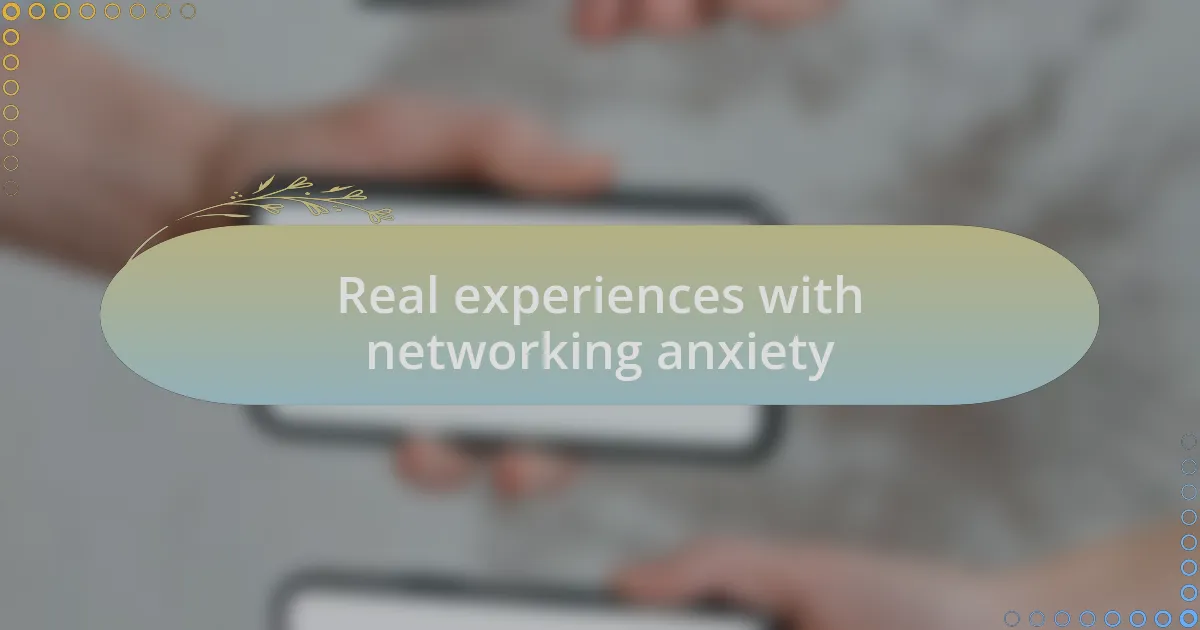
Real experiences with networking anxiety
Networking anxiety often creeps up on me when I see a room full of unfamiliar faces. I vividly recall a local chamber event when my palms were sweating, and my heart raced. I stood awkwardly at the entrance, wondering if anyone would really want to talk to me. Have you ever felt that excruciating moment of indecision, where you contemplate turning around and heading back home?
During one particularly challenging event, I found solace in a simple technique: focusing on one conversation at a time. I remember chatting with a fellow attendee about a mutual interest in community engagement, and it was as if the weight of the room lifted. This experience taught me that networking doesn’t have to be overwhelming; it can be deeply rewarding when you share genuine moments with others. Have you discovered a way to break through that initial barrier of anxiety?
Sometimes, it helps to acknowledge the discomfort rather than pretend it doesn’t exist. I recall attending a workshop where the speaker openly shared their own struggles with networking anxiety. This moment of vulnerability created a sense of camaraderie, reminding me that many people feel the same way. At that moment, I realized that being open about my anxiety could lead to deeper connections. Isn’t it incredible how shared experiences can transform our perspective?
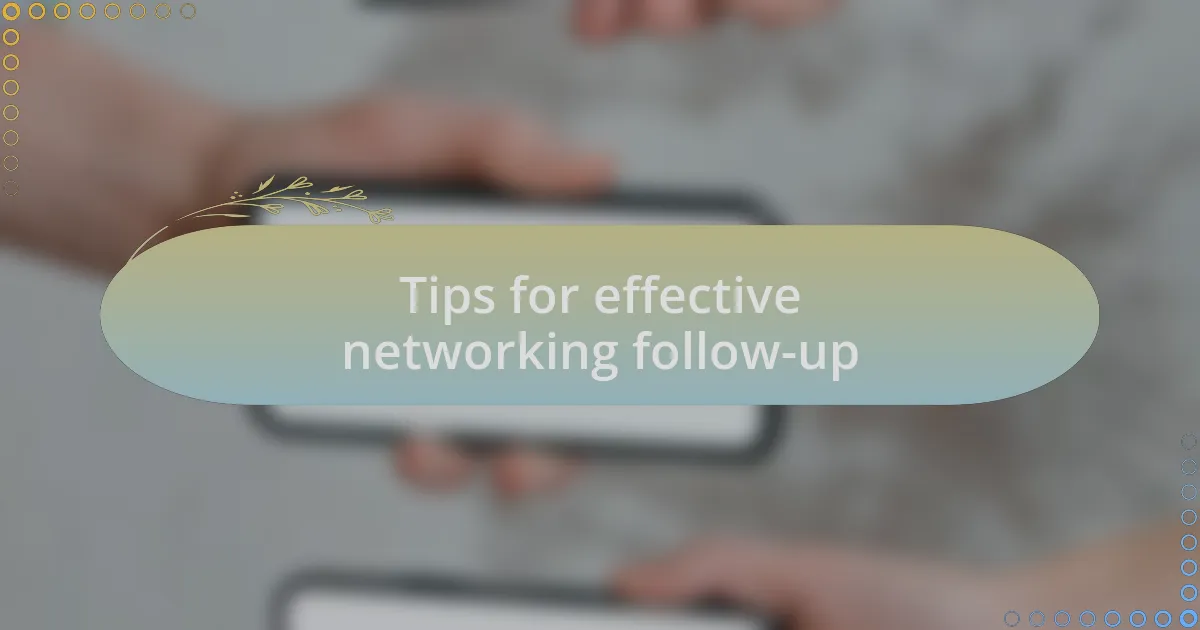
Tips for effective networking follow-up
Following up after a networking event can often feel daunting, especially if you’re already grappling with anxiety. I’ve found that sending a brief message within 24 to 48 hours of meeting someone makes a significant difference. Just a casual note saying it was nice to meet them can open doors for future conversations and help relieve some pressure – after all, it shows that you value their time.
Another effective tip is to personalize your follow-up. I always try to reference something specific from our conversation. For instance, if they mentioned a favorite book or project, I might say, “I’ve been thinking about our chat on X; I checked out that book you recommended!” This small touch not only demonstrates that I was genuinely engaged, but it also fosters a deeper connection. How often have you felt touched by someone remembering the little things?
Lastly, don’t forget to be patient and give people time to respond. Early in my networking journey, I dreaded the silence after I hit send, convinced it was a sign of disinterest. But I’ve come to realize that everyone has their own pace. Returning to the initial connection when they do reply can reinvigorate the relationship and ease my anxiety about follow-ups. Have you experienced the relief of hearing back after a few days of waiting?